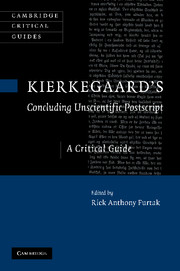Book contents
- Frontmatter
- Contents
- List of contributors
- Acknowledgments
- List of abbreviations
- Introduction
- 1 The “Socratic secret”: the postscript to the Philosophical Crumbs
- 2 Kierkegaard's Socratic pseudonym: A profile of Johannes Climacus
- 3 Johannes Climacus' revocation
- 4 From the garden of the dead: Climacus on interpersonal inwardness
- 5 The Kierkegaardian ideal of “essential knowing” and the scandal of modern philosophy
- 6 Lessing and Socrates in Kierkegaard's Postscript
- 7 Climacus on subjectivity and the system
- 8 Humor and irony in the Postscript
- 9 Climacus on the task of becoming a Christian
- 10 The epistemology of the Postscript
- 11 Faith and reason in Kierkegaard's Concluding Unscientific Postscript
- 12 Making Christianity difficult: The “existentialist theology” of Kierkegaard's Postscript
- Bibliography
- Index
- References
3 - Johannes Climacus' revocation
Published online by Cambridge University Press: 04 August 2010
- Frontmatter
- Contents
- List of contributors
- Acknowledgments
- List of abbreviations
- Introduction
- 1 The “Socratic secret”: the postscript to the Philosophical Crumbs
- 2 Kierkegaard's Socratic pseudonym: A profile of Johannes Climacus
- 3 Johannes Climacus' revocation
- 4 From the garden of the dead: Climacus on interpersonal inwardness
- 5 The Kierkegaardian ideal of “essential knowing” and the scandal of modern philosophy
- 6 Lessing and Socrates in Kierkegaard's Postscript
- 7 Climacus on subjectivity and the system
- 8 Humor and irony in the Postscript
- 9 Climacus on the task of becoming a Christian
- 10 The epistemology of the Postscript
- 11 Faith and reason in Kierkegaard's Concluding Unscientific Postscript
- 12 Making Christianity difficult: The “existentialist theology” of Kierkegaard's Postscript
- Bibliography
- Index
- References
Summary
REASONS FOR REVOKING
On page 522 of Postscript, Johannes Climacus says that everything he has said up until then is to be “understood in such a way that it is revoked.” On the preceding page he describes the book as “superfluous” (CUP 521). This must come as a surprise to most readers hardy enough to have reached that point. Could this be a further twist to the self-advertised humorist's playful mood? In whatever way we grasp them, the humorist's words suggest that if we have understood him – but perhaps also his humor? – we should not be surprised. Taking a chance on at least this remark being serious, that means that if we had really understood him up to this point we should have been expecting a revocation, or at least suspecting something of the sort; the greater our surprise, the less we have understood.
A playful and sometimes acerbic irony characterizes Climacus' gargantuan book. More than merely a decorative interpolation in the text, the irony more often has the feel of a default mode into which the author relapses whenever the (often very long) bouts of serious discussion are over. This underlying tone of irony is also in evidence here: Climacus suggests a parallel with the Catholic Imprimatur: “in Catholic books, especially from former times, one finds at the back a note informing the reader that everything is to be understood conformably with the doctrine of the holy universal mother church” (CUP 522).
Keywords
- Type
- Chapter
- Information
- Kierkegaard's 'Concluding Unscientific Postscript'A Critical Guide, pp. 45 - 63Publisher: Cambridge University PressPrint publication year: 2010
References
- 1
- Cited by

